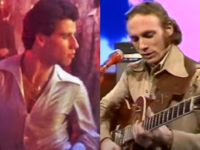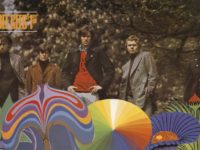The Bee Gees were in a precarious position when their only original double album was first released in the UK in March 1969. They turned in a masterpiece.
After two years of solid worldwide success and big hits, the group was not getting along during recording sessions for Odessa. Original Bee Gees lead guitarist Vince Melouney had left in November 1968 after the album was well underway, because there was little for him to do guitar-wise with their new lush orchestral direction. Equally, tension was growing between the Bee Gees’ core group of brothers after their first brush with fame. Melouney appears only on a couple of tracks.
That absence left the four remaining band members to complete Odessa, so drummer Colin Petersen and Barry, Maurice and Robin Gibb took the task head-on and did just that. What they came up with was a masterpiece. Funny enough, it was almost titled Masterpeace at one point. (The same can also be said for their essential Bee Gees 1st from 1967.)
Odessa has been called a concept album but Barry Gibb dispelled that notion early on. You can sort of draw a connection to a couple of these songs but after that, no. “Odessa (City on the Black Sea)” sets the tone for the whole project, and it’s a grand dramatic one. Maurice Gibb’s gorgeous Flamenco guitar flourishes are among song’s highlights, along with the swelling orchestral ocean by Bill Shepherd. The vocals arrive as if descending down from heaven. Dramatic flair was always one of their strongest points in the Bee Gees’ early years.
The folky, Robin Gibb-sung “Black Diamond” is a very different sound than you would expect, but it’s most welcome. “Edison” is a catchy gem of a song, done in tribute to Thomas Edison’s invention of the light bulb; it’s one of the best songs on the whole album. The gorgeous “Melody Fair” is another Beatles-esque gem you’ve probably heard before on an old Bee Gees compilation. A couple of songs pointed to the future that would figure more on their next album Cucumber Castle: the country-rock ballad “Marley Purt Drive” (think of the Band with Barry Gibb on lead vocals), and Maurice’s confidently sung, baroque-inflected “Suddenly.”
Robin’s love-eternal ballad “Lamplight,” according to legend, was his choice for the LP’s first single – and the reason he briefly split from the Bee Gees not too long after Odessa was released for a solo career. Barry’s “First of May” was issued instead as the A-side, with the former tune as the B-side. They’re both beautiful and you can go either way on what should’ve been the lead song. It must’ve been tough to pick a single back then: “First of May” is another timeless, wistful love song of past years gone by and love lost. It really tugs at your heart.
The English-looking-down-on-Australians themed “I Laugh In Your Face” features those grand Bee Gees harmonies you’ve known and loved. Three dramatic orchestral-only Gibb-penned songs (“Seven Seas Symphony,” “With All Nations,” “The British Opera”) – conducted yet again by Shepherd – weave in and out of the album.
A deluxe three-disc boxed reissue of Odessa which arrived in 2009 from Rhino/Reprise, and included a pair of previously unreleased mid-tempo songs called “Nobody’s Someone” and “Pity.” It was a long overdue and much welcomed reissue: The whole double album was superbly remastered onto two discs, in both the stereo and mono mixes, along with a third disc entitled Sketches for Odessa that was dedicated to demos, alternate versions, a rare 30-second promotional record store spot and the two unreleased songs.
Sound quality-wise, you’ll notice a lot more clarity, detail and depth than you’ve ever heard before. Rhino Records also reissued a vinyl version in 2009. Who knew there was actually a mono version of Odessa released in 1969? Apparently, this mix was worldwide then, but not available in America. Rhino even replicated the original 2-LP set’s beautiful red felt cover with gold lettering and the green illustrated inner sleeve art for the compact-disc sized box. Within, the discs were housed in paper LP-like sleeves. A nice booklet briefly detailed the album’s story, with previously unseen Odessa-era photos and there was even a cool fold-out poster of the group.
There was also a fab Bee Gees sticker that replicated Colin Petersen’s original drum head. I would’ve liked to have heard comments, whether new or old, from the Bee Gees themselves in addition to Andrew Sandoval’s fine liner notes. But overall, the reissue served as another reminder that Odessa just keeps getting better.
Decades later, this LP still stays with you.
- How the Bee Gees Overcame It All to Produce the Magical ‘Odessa’ - March 29, 2024
- How an ‘Antique French Garage Band’ Nailed the Whole Soul Music Vibe - November 27, 2022
- Kyte – ‘Kyte’ (2009): Forgotten Series - April 9, 2022




